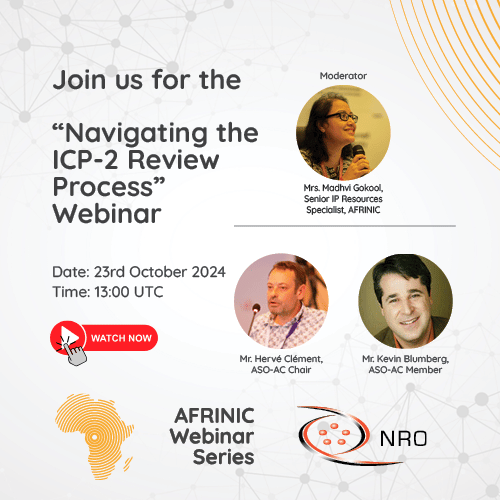March 15 2017 - The AFRINIC NomCom 2017 is pleased to invite nominations for candidates to run for an open seat on the NRO-NC for AFRINIC region. The seat is currently held by Douglas Onyango.
The term for the elected candidate will be from 1 January 2018 to 31 December 2020 (3 years). You can find out more about the AFRINIC NRO-NC Election Process here.
The NRO-NC serves as the ICANN ASO-AC according to the ICANN ASO MoU.
Current representatives from the AFRINIC region on the ICANN ASO AC are:
- Douglas Onyango (Jan 2015 - Dec 2017)-Open Seat
- Fiona Asonga (Jan 2017 - Dec 2017) - Appointed by the AFRINIC Board
- Omo Oaiya (Jan 2017 - Dec 2019) .
Responsibilities of the ICANN ASO-AC
- Undertaking a role in the global policy development process
- Providing recommendations to the Board of ICANN concerning the recognition of new RIRs, according to agreed requirements and policies as currently described in https://www.icann.org/resources/pages/new-rirs-criteria-2012-02-25-en
- Defining procedures for selection of individuals to serve on other ICANN bodies, in particular on the ICANN Board, and implementing any roles assigned to the Address Council in such procedures.
- Providing advice to the Board of ICANN on number resource allocation policy, in conjunction with the RIRs.
- Developing procedures for conducting business in support of their responsibilities, in particular for the appointment of an Address Council Chair and definition of the Chairs responsibilities.
For more information about the NRO-NC and the ASO-AC, please go to: http://aso.icann.org/
Eligibility
Open to individuals residing within the AFRINIC region of service. All nominations (including self-nominations) must be supported by a minimum of two AFRINIC community members; the two individuals must not work for the same organization.
A person may only nominate one candidate - and, in case of multiple nominations by the same person, only the last nomination will be considered valid. AFRINIC or other RIR staff can neither nominate candidates nor be nominated for an ASO AC seat.
Nominating Procedure
Please submit your nomination using the on-line nomination form here
Deadline for Nominations
The Closure of the Candidate Nomination period is 22nd April 2017 at 20:00 UTC.
Please note that the election will take place during the AFRINIC-26 meeting in Nairobi Kenya from 31st May-02 June 2017,
An eligible voter shall be:
Any one from the AFRINIC community present at the face-to-face meeting who meets the following criteria:
- Has registered to attend the AFRINIC-26 meeting (must present the meeting badge as proof),
- Resides in a country within the AFRINIC service region and
- Is not AFRINIC staff.
Ballots for the vote will be distributed at meeting registration desk by AFRINIC staff.
Voting by Proxy: Proxy voting is not allowed for the NRO-NC representative election.
NomCom 2017

